By Dave Workman | Senior Editor
The executive director of the Sporting Arms and Ammunition Manufacturers’ Institute (SAAMI) cautioned hundreds of Second Amendment activists at the Gun Rights Policy Conference to be wary of elites and “far left activists,” because they have a need to control and “will say or do anything to win.”

Rick Patterson
SAAMI’s Rick Patterson told his audience about “Civil Society,” which is defined as a “third sector of society, along with government and business, and its involvement in the United Nations Arms Trade Treaty process. The U.N. definition of Civil Society might be worth Patterson’s caution.
“It comprises civil society organizations and non-governmental organizations,” according to the U.N. definition. “The UN recognizes the importance of partnering with civil society, because it advances the Organization’s ideals, and helps support its work.”
Patterson expressed concerns about what he called the “militarization of the corporate world.”
“Look what corporations are getting involved with,” he observed. “It has nothing to do with their product anymore. It has to do with wealthy CEOs looking to exert power and influence beyond their companies.”
When the New York Times and other news agencies recently reported the heads of 145 corporate executives had signed a letter demanding more gun control, Patterson did some homework. He said most of the firms were small companies whose names he didn’t recognize.
“There are 18,203,000 corporations in America alone; 145 signed a piece of paper supporting gun control,” he noted. “That is not the widespread support for gun control as was portrayed. But it does represent what we see as the elite trying to control without an election.”
“The elites I refer to are the people who have money who think they have all the answers,” he added. “They think they should be controlling what you and I do. That’s the elites.”
He contended that when it is all “boiled down,” there is a commonality with their approach and that of the political left.
“These far left activists; they have a need to control,” Patterson explained. “That’s fundamental to what they’re trying to accomplish. They’re angry, we scare them. We can take care of ourselves. We can protect ourselves. We can provide food for ourselves. We are self-supporting. We do not need the systems, the institutions that they’re comfortable with. This whole issue really boils down to whether you trust individuals or do you trust institutions.
“They want us co-dependent on their institutions,” he stated. “As long as we have firearms we aren’t.”
Another trait of the political left, he continued, is that “they will also do or say anything to get their point across.”
“They are intolerant of differences,” Patterson said. “There is no compromise in their approach. They will take little by little by little, but there is no compromise and we know what their end game is. And thank goodness for Beto (O’Rourke) making that abundantly clear and bringing that out into the light.”
Since the Democrat presidential candidate blurted during the recent candidates’ debate his intentions to seize all semi-auto rifles, gun owners have declared the Democrat Party to be the “party of gun confiscation.” It’s a label Democrats will find uncomfortable as the 2020 election season looms.
Lastly, Patterson observed about the Left is that, “They don’t accept responsibility for their own actions. How many of the mass murders with firearms happen in gun free zones that they created? They won’t take credit for that, they won’t take responsibility for that.
“They obviously have feelings of superiority,” he said. “They obviously have all the answers. They blame law abiding citizens for problems created by murderers.”
More on State Affairs
Patterson was followed by the second State Legislative Affairs panel of the conference. Leading off the discussion was Sean Caranna, founder and co-executive director of Florida Carry, Inc. Like earlier speakers, he acknowledged that gun owners are “facing lots of money; big money donors” who even contribute to Republican lawmakers in an effort to influence their decisions about gun control.
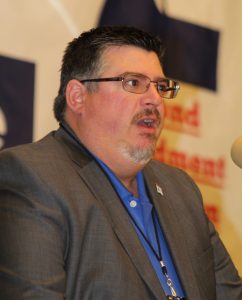
Sean Caranna
Caranna admitted that some “horrible” gun laws have been passed by the Florida Legislature that rights activists were “powerless to stop.” This is the problem gun owners in Florida are facing, even with more than 2 million active concealed carry licenses now in circulation.
“We’ve had a huge influx of money from the likes of (Michael) Bloomberg,” he lamented.
His group has sued the Florida Department of Law Enforcement for dragging out the time it takes for the agency to conduct a background check. There has also been legal action regarding fees charged to law enforcement officers and concealed carry license holders, he reported.
Caranna is wary of state lawmakers who may not be friendly to gun owners as the next session of the Legislature looms. Next year’s conference will be in Orlando, and there may be much to report at that time.
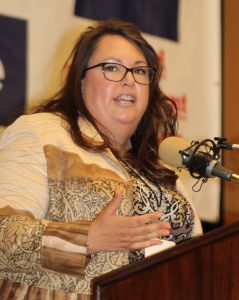
Patricia Harrold
Following Caranna’s report, Patricia Harrold, president of the Nebraska Firearms Owners Association, began by noting the diversity of those in attendance.
“But we’re missing something,” she said, asking how many in the audience were under age 25. Only four people raised their hands.
“If we don’t…work to raise the next generation of freedom fighters,” she warned, “we will be the last generation to express these freedoms and rights.”
In Nebraska, she said a coalition—Second Amendment for the next generation—is being created to train families and younger people to “build on all the work” other groups have done to protect the right to keep and bear arms. This effort will teach young people “what they’re not learning in schools.”
She acknowledged that social media channels are “getting shut down” so the message of gun rights is not getting widely circulated.
“We have a lot of work to do in our legislature,” Harrold said.
Nebraska does not have state preemption, so gun rights battles are being fought at the local level, “and that’s a tougher fight.”
“So whether we have to fight from above or below, we have to raise that next generation,” she said, “so we have to combat the idea that we’re a dying breed.”

Keely Hopkins
Harrold was followed by Keely Hopkins, NRA-ILA state director for legislative activity in Arizona, Washington and Oregon. She has had a busy year in the Pacific Northwest, where it seems “Oregon and Washington have been in a race to see which one can catch up to California gun laws the fastest.
“Historically,” she recalled, “Oregon and Washington have had relatively good gun laws. In the last four or five years, however, things have changed.”
Seats have been lost in the legislatures, and there have been billionaire-backed initiative campaigns that have succeeded. Governors in both states are anti-gun, and gun control proponents control both legislatures.
Washington is possibly the worst of the two states because three gun control measures have been passed there since 2014, all financed by a handful of wealthy backers. Those initiatives covered gun laws they were unable to push through the legislature.
Oregon essentially got lucky this year with Republicans standing firm to block gun control and some other legislative proposals. That may not happen again in 2020.
Hopkins focused on Washington’s Initiative 1639, passed last November, which defines a “semi-automatic assault rifle” in a way that literally every self-loading rifle ever manufactured falls under the definition.
“We know why they do that,” she observed. “It’s so they can come back next year and ban assault rifles.”
In Oregon, groups tried to push initiatives to ban all semi-auto firearms and require mandatory storage. Hopkins noted that some Democrats in Oregon – same as in Washington – are pro-gun, “so we’ve been able to hold the line.”
She said grassroots activists need to make their voices heard.
“We can’t let Moms Demand Action be the only voice that our legislators are hearing,” Hopkins concluded.
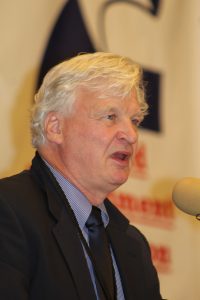
Mark Pennak
Mark Pennak, president of Maryland Shall Issue, told activists that what impresses lawmakers is “presence.” He called Maryland “the belly of the best” in terms of gun control, even though one of its nicknames is “The Free State.”
He warned that “what starts in California will happen elsewhere,” including gun control. Maryland has the “dubious distinction” of being the only state with a so-called “red flag law” that within 30 days of its enactment “resulted in the death of a gun owner at the hands of the police.”
That said, gun owners were able to defeat a number of gun control proposals in the legislature this year. That happened because activists became acquainted with lawmakers.
“I urge every single owner of a firearm to get to know their representative,” Pennak advised, and not just by telephone or email.
The idea is to become familiar with office staff, he indicated. Pennak said politicians understand that for every person they talk to, ten or 20 other voters feel the same way, and the thing most important to a politician is getting re-elected. Every vote matters, he said.
There is a great opportunity on the horizon, according to Pennak, who is an attorney. He assured the audience that the Supreme Court “is going to decide a Second Amendment case.”
He said at least six cases are pending before the high court, and he predicted the court will hand down a ruling that will set a new standard of review for Second Amendment litigation.
Pennak cautioned, however, “We have to be very selective in the cases we push at the Supreme Court.”
“Nothing wins like winning,” he stated, “and nothing is more demoralizing than losing.”
Bryan Strawser, chairman of the Minnesota Gun Owners Caucus, discussed the situation in The Land of 10,000 Lakes. He began by noting that Democrats—known as the DFL for Democrat Farmer Labor Party—has a 20-seat majority over Republicans and it is a progressive, anti-gun group based in the Twin Cities metro area. Their members ran “on every form of gun control you’ve heard talked about,” he explained.
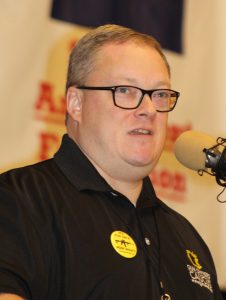
Bryan Strawser
There is a two-seat GOP majority in the State Senate.
Minnesota Gov. Tim Walz, Strawser asserted, had an “A” rating until he ran for the governor’s office.
“He wanted to be governor of Minnesota, and now you would think he had been a gun control advocate all his life,” Strawser said.
He said Bloomberg’s Everytown and Moms Demand Action outspent pro-gun groups 14-to-1 in the last election.
Still, Republicans held the line in the Senate, and gun control bills gathered dust. This was accomplished by grassroots activism that included attending hearings in the legislature, attending gun control meetings to show their agenda online, and their executive director was in the capital every day. They used new media, such as Facebook Live and YouTube Live.
The effort paid off, and lawmakers knew gun owners “had their backs,” he concluded.
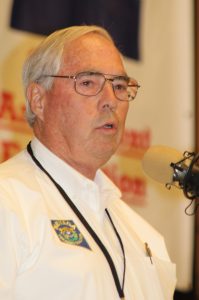
Don Turner
From Nevada, Don Turner, president of the Nevada Firearms Coalition, warned the activist audience that what they see happening in Washington and Oregon will be “coming to Nevada.”
“There’s a cancer growing from the West Coast spreading east,” he said, “and that cancer is word-for-word gun control laws in every state.”
Clark County, which encompasses Las Vegas, dominates the state’s politics, and the unions dominate Clark County. The Firearms Coalition in 2017 started a women’s shooting program in Clark County to change that. Some 3,000 women have taken the class, and the majority of them are union members.
Nevada’s Legislature every other year, but last year the state turned “blue” and they are facing more gun control efforts as a result.
When the legislature convened earlier this year, on the first day gun owners descended on the capitol where a hearing was held on a background check measure.
“Over 500 gun owners showed up to protest,” Turner recalled. “It was the longest session in Nevada history. It took nine hours and that scared them. They had proposed nine gun bills and they dropped most of them.”
However, lawmakers ran a couple of bills and passed them in the same week.
Democrats were strongly supported by anti-gunners, and they introduced an “omnibus” bill that included all sorts of gun control measures. The grassroots responded with rallies, generated 1,100 telephone calls and 168,000 letters to lawmakers opposing the legislation, which included eliminating state preemption.
The bottom line is that gun owners interested in retaining their rights must be part of the movement. Contact state lawmakers and push back hard against gun control proponents.



